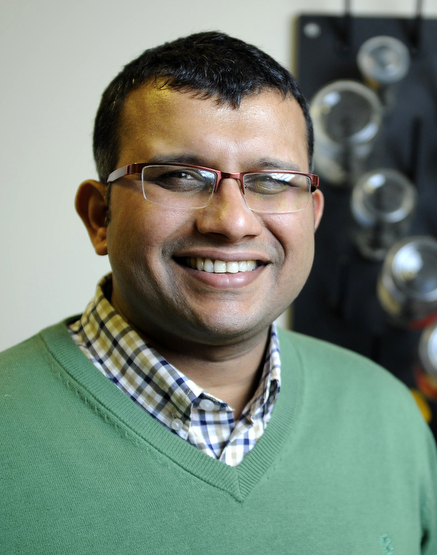Ameet J. Pinto received his PhD (2009) in Civil Engineering from Virginia Tech with Prof. Nancy Love. He did his post-doctoral research with Prof. Lutgarde Raskin and Prof. Chuanwu Xi at the University of Michigan before working as a Lecturer at the University of Glasgow (2012-2015). He has recently started as an Assistant Professor in the Department of Civil and Environmental Engineering at Northeastern University.
His research focusses on microbial ecosystems at the interface of infrastructure and environmental/public health, with a particular focus on drinking water microbial ecology. You can find out more about his research interests at www.pintolab.com.
– How has your research evolved from your first to your most recent article?
My first research article was on development of process strategies to mitigate the impact of toxic contaminant spills on wastewater treatment plants and this one is on microbial communities in drinking water systems. Over the years, I have moved from process engineering to microbial ecology while also transitioning from one end of engineered water cycle (wastewater) to the other (drinking water). It has been a fun learning experience; one that has helped me appreciate the critical relationship between microbiology, technology, and environmental/public health.
– What aspect of your work are you most excited about at the moment?
I have been thinking a lot lately about how we could predict and (possibly) control microorganisms that end up in our water supply system. It’s really not very novel – wastewater engineers and treatment plant operators have been doing it for a long time. It’s just that a majority focus in the drinking water field has been on eliminating biology rather than exploiting it – and that’s the space where I think there is lots of room for innovative thinking and exciting research.
– What do you see as the biggest challenge or threat to drinking water distribution systems?
In the immediate future – water conservation. Enforcing water conservation practises at the consumer’s end without addressing the legacy infrastructure that transports water to them seems short sighted. It will have significant implications for water quality and safety.
– How did you find out about the Environmental Science journals and how was your experience publishing with us?
I don’t remember how I heard about the Environmental Science journals, but I have been reading papers in Environmental Science: Process and Impacts for a few years now and was really happy to see the launch of Environmental Science: Water Research and Technology in 2015. My experience with the submission and review process was excellent and look forward to submitting here again in the future.
– We can see you are active on Twitter (@watermicrobe). What are your views on social media and academia?
Addictive and essential. I have new collaborations courtesy of Twitter with great researchers I have never met in person! Three things I love about twitter: (1) stay up-to-date on what’s new in research – particularly in fields outside my own, (2) bioinformaticians talk shop there, and (3) good venue to promote some of your own work to a broader audience. And also, @DrScienceCat
– In which upcoming conferences or events may our readers meet you?
I will be at ASM Microbe 2016 in June. I am co-convening a session on the Urban Water Cycle Microbiome with Lut Raskin at that conference. I will also be at the International Society of Microbial Ecology Conference in August and the Microbial Ecology in Water Engineering conference in September. It is shaping up to be an exciting summer!
– How do you spend your spare time?
Netflix.
– Which profession would you choose if you were not a scientist?
If not a scientist, I think I would have been teacher. As a University Faculty, I get to do both. #winning
– Can you share one piece of career-related advice or wisdom with other early career scientists?
Talk about your ideas often and openly. If it is a good one, someone might offer to help you out with it or if they are already working on it, they’ll invite you to collaborate. If it is a bad one, someone might talk you out of it.











